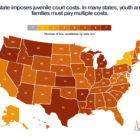
Police and Black Teens: “If I Get Pulled Over Today…”
|
At the Big Brothers Big Sisters of Metro Atlanta, Michael Gandy, now 28, draws from personal experience as a young black teen.
Juvenile Justice Information Exchange (https://jjie.org/tag/youth/page/2/)

At the Big Brothers Big Sisters of Metro Atlanta, Michael Gandy, now 28, draws from personal experience as a young black teen.

Fines and fees imposed in juvenile court can drive youth deeper into the system and their families deeper into poverty, a new report says.

A proposed federal grant program aims to encourage cooperation between states’ juvenile justice and child welfare agencies, to help youth who encounter both systems.

Less than 48 hours after the Caesar Goodman verdict left many in Baltimore longing for justice, the city was dealt another blow when popular rapper Lor Scoota, known and loved for giving back to the community, was shot and killed.

I firmly believe that resilience is not just something you’re born with — it’s something that can be taught to both children and adults. This breakthrough idea comes after years of working directly with students, but current research backs me up.

DeAngelo Cortijo remembers the fear he felt as a young boy on the day his mother was lifted unconscious into an ambulance. He thought he would never see her again.

Research over the past several decades has established that youth exposure to violence is a widespread and significant problem. This is particularly true for youth involved in the juvenile justice system, as research has shown that up to 90 percent of these youth have histories of violence exposure, with many reporting multiple serious incidents.

Moriah Barrett, then 14, woke up to burns on her body one night along with physical evidence that she had been raped. She had been invited to a party the night before by someone she considered a friend.

They’re labeled thugs, treated like throwaways and classified by some as “superpredators”: teenage boys and girls who seek sanctuary in gangs, commit violent crimes and end up in the criminal justice system. Not only are they physically locked up, but these children are caged in emotional turmoil.

It was four years ago Friday that an unforeseen incident would be the catalyst to start a national movement. On the evening of Feb. 26, in Sanford, Florida, a 28-year-old man with a gun got out of his truck and confronted, chased, shot and killed a 17-year-old unarmed black kid. Trayvon Martin was merely walking home from a convenience store with a bag of Skittles and a can of Arizona Iced Tea.